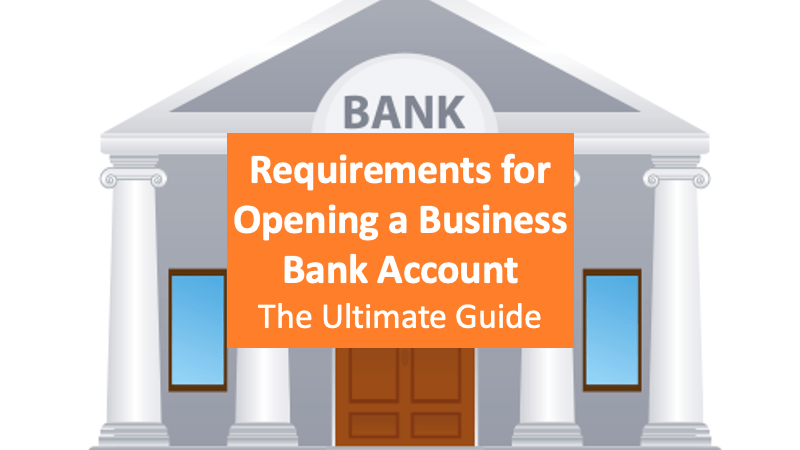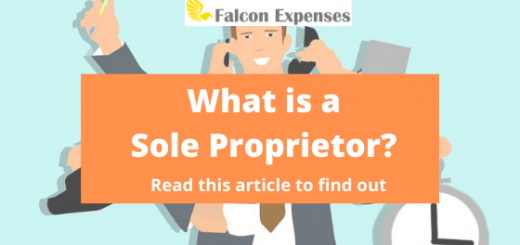Requirements for Opening a Business Bank Account: The Ultimate Guide
Table of Contents
Read to learn the requirements for opening a business bank account. Our guide is targeted at small business owners and sole proprietors that want to open a business bank account.

Are you ready to open a business bank account and now you want to know the requirements for opening a business bank account?
Read this article and we provide you with all the requirements, in detail, to open a business bank account.
This is THE ultimate guide, we don’t miss a point. We provide EVERY requirement. In addition, for each requirement, we explain what that requirement is. About the requirement and how to get the necessary information and items needed to fulfill the requirement. Our detailed explanation of each requirement is particularly helpful for the less common and more confusing requirements for opening a business bank account.
So keep reading, and read all the way to the bottom so that you don’t miss a beat.
What do I need for a business bank account?
When you open a business bank account, whether online or in-person, there are a few items you will need. It’s important to gather these items before you open your business bank account, especially if you’re going in person to the bank, to open your account.
Below is a list of what you need to open a business bank account.
What documents do I need to open a business bank account?
These are the documents needed for opening a business bank account.
This is the shortlist of the documents needed for opening a business bank account, and below this list is a detailed description of each item.
- EIN or SSN
- Personal Identification Documents
- Business Formation Documents
- Ownership Agreements
- Business License
- DBA “Doing Business As”
Employer Identification Number (EIN) or Social Security Number (SSN)
A lot of sole proprietors and small business owners don’t have employees or a legal business entity, such as a single-member LLC or an LLC. Therefore, the only identification number they have is their Social Security Number.
With that said, many sole-proprietors and independent contractors use their SSN numbers to do business. Your Social Security Number is located in the upper right corner of your 1099 forms. However, some business owners have an EIN.
An EIN is also known as an Employer Identification Number or a Federal Tax Identification Number.
What is an EIN?
An EIN is an Employer Identification Number issued by the IRS for the identification of a business. Also, the IRS uses EIN numbers to keep track of a business’s tax reporting. An EIN is a nine-digit number that looks like a Social Security Number.
To open a business bank account you need documentation of your SSN or EIN number. Your EIN or SSN number serves as proof of identification. However, if you have an EIN number, the bank will probably also ask for your SSN number. So bring both to be completely prepared.
Personal Identification Documents
Personal identification documents are required to open a business bank account.
You might be thinking a Social Security Number is a personal identification document. However, in this case, what we mean by personal identification documents, are a state driver’s license, state ID, or a US Passport.
Banks usually require proof of identity to deposit funds or open a business bank account. This is particularly true if you don’t already have an existing relationship or bank account with the bank where you want to open your business bank account.
Business Formation Documents
Some freelancers, independent contractors, and sole proprietorships have officially registered their business as a legal business entity. The most common legal business entity used by sole proprietors and small business owners is an LLC. More specifically, a single-member LLC.
An LLC is also known as a Limited Liability Company.
Also, there are other types of business entities a sole proprietor can form. For example, a small business owner might form an S Corp or a C Corp.
There are many online resources to help with incorporating and forming an LLC or other type of business entity. Also, consulting with an attorney is beneficial. A lawyer can help with the formation of your legal business entity, particularly for more complex business structures.
Pro Tip
You need to pick a state where you form your legal business entity, such as an LLC. Forming a legal business entity in Wyoming or Delaware is a popular choice. Delaware and Wyoming are two states known for low costs, low fees, and a business-friendly environment and legal systems. However, you may be required to incorporate in your state of residence if your business operations are mainly done in person.
When you form a legal business entity, such as a Limited Liability Company (LLC) you receive business formation documents. This is true regardless of whether you form a single-member LLC, an LLC, or an S Corp, etc.
When you open a business bank account you need to provide the bank with your business formation documents.
Ownership Agreements
Your articles of incorporation will specify who owns your business. For businesses that are partnerships, it is important to have a partnership agreement.
What is an Ownership Agreement?
An Owners Agreement is a document between the owners of a company. Businesses with one owner also have ownership agreements.
This agreement specifies how to manage the business, who owns the business, and how much of the business each person owns. Depending on the structure of the business sometimes their agreements are called Buy-Sell Agreements or Shareholders Agreements.
You need to show your business ownership agreement to the bank where you’re opening a small business bank account. This is because the bank needs to know who owns that business that the business bank account is being opened for.
Business License
Your state may require you to have a business license depending on the nature of your business.
What is a business license?
A business license is issued by your state. A business license gives you permission from your state or municipality to do business in the location where you do business.
You’re probably wondering, am I required to have a business license?
The good news is, not all business types are required to have a business license. Also, the requirements to get a business license vary from city and state to state. It is much harder to get a business license in some locations than in others.
When you open a business bank account you need to provide a copy of your business license if you have one.
DBA, “Doing Business As”
What is a DBA?
DBA stands for, Doing Business As. A DBA is any registered name a business uses for its operations that is not its legal registered name.
In some states, a DBA is required for businesses that are operating under different names than their registered name. Therefore, bring your DBA documents ready when you go to open your business bank account. Or have your DBA documents nearby if you plan on opening a business bank account online.
How to open a business bank account
As a sole proprietor or small business owner, you probably keep a close eye on fees, this would also include bank fees. With that said most small business owners would prefer to open a business bank account with no fees.
While it likely doesn’t cost any money to open a business checking account, many mainstream bank accounts charge a monthly service fee. Also, some smaller banks do too.
Example fees a small business bank might charge:
- Monthly service fee
- Wire transfer fees
- Transaction fees (such as for using a different banks ATM to withdraw cash)
Therefore, when you’re researching small business banks make sure to keep an eye out for fees.
When you’re ready to open a business bank account, here’s what you need to do.
1. Decide what business accounts you need
There are different types of business bank accounts just like there are different types of personal bank accounts. For example, just like you have personal checking accounts, there are also business checking accounts. Also, there are a lot of benefits of having a business bank account.
Here are a few of the most common types of business bank accounts:
Business checking account
A business checking account is similar to a personal checking account. Just like a personal checking account, business checking accounts are for receiving payments and spending. Basically, for your day-to-day transactions. In a business checking account, you keep your working capital. It’s possible to earn interest on these funds, but interest-bearing business checking accounts are rare.
Business savings account
A business savings account is like a personal savings account, except for your business. In your business savings account, you put money that your business has earned, which you don’t plan on spending in the near future. For example, you don’t need it for working capital; however, you want to save it as retained earnings.
One of the perks of a business bank account is that some business savings accounts earn interest over time. Therefore, look for a business savings account with a high-interest rate if you plan on saving a lot of money that your business earns. Also, keep in mind that while savings business accounts earn interest over time, there are also limits to how much you can take out at one time.
Merchant services account
A merchant services account allows your business to accept credit card and debit card payments. Therefore, a merchant services account would be something you should look for if your business receives payment from customers via credit or debit card.
2. Choose a bank
After you have decided which business bank account, or possibly business bank accounts (with a plural) you need you should consider the following business bank account features. We feel the features listed below are the most impactful features to your decision about which bank to open your business bank account with.
Account types offered
Choose a bank that offers the business bank account types that you need, which support your business needs. However, also consider your business’s future needs and make sure the bank you choose will support your business’s future needs. This is because it’s always easier to work with a bank that you already have an established relationship with. Some of the things your business might need in the future that the correct bank and financial institution can offer you are business loans, credit cards, lines of credit, merchant service accounts, and much more. Therefore, keep this in mind when shopping for a business bank account.
Fees
Just like personal bank accounts, business bank accounts might have fees, and some of these fees might feel like hidden fees when they show up on your business bank account statements. Therefore, it is important to educate yourself on the different types of fees banks could charge you to operate a business bank account.
Here is a list of fees to look out for:
- Monthly fees
- Per-transaction fees
- Fees for using ATMs outside of the network
- International transaction fees (usually around 3%)
- Wire transfer fees
- Deposit fees
Take into consideration each of these fees when evaluating a business bank account. Then, choose a business bank account that has a fee structure, or a no-fee structure, which best meets your needs.
Interest rates
This feature matters most if you’re in the market for a business savings account. However, some business checking accounts offer an interest rate as well, so make sure to look at the interest rates for both. With that said the higher the interest rate, the better, as the more interest you earn on your money, the more money you make. However, do consider the interest rate feature against the other features, and take everything into consideration appropriately for your unique needs.
Branch and ATM network
For some of you reading this article, you have business needs that require you to use an ATM often. Therefore, whether you choose a business bank that has physical locations, or one with just an online presence, be sure the business bank account they offer has ATM fee reimbursements or a large network of ATMs within close reach to you. ATM fee reimbursements are kind of cool.
Many banks will refund you the fee charged to you for using an ATM that is not your bank’s ATM. In addition, these same banks won’t charge you a fee each time you use an ATM. ATM fees add up, especially if your business requires you to use the ATM a lot as a part of your business operations.
Account management tools
There are many account management tools a good business bank account should offer.
Here are some of the tools you should look out for:
- User-friendly mobile app
- View balance online
- Pay bills online
- Move funds via an online account
3. Gather the required documents
After you have decided which type of business account you need, you’ve selected a bank, you need to gather the documents required to open a business bank account. We listen to the required documents for opening a business bank account. In addition, we explained each one, and what it is, so that you are not confused in any way. So gather those documents and get prepared for the next step, which is applying for a business bank account.
4. Apply for your business bank account
Applying for a business bank account might seem daunting at first. However, for many business bank accounts, the process is quite simple. In addition, for most banks, you don’t even need to go through the hassle of going in person. Today, most banks offer the feature to apply online for a business bank account.
Applying for a business bank account should not take long, especially if you have all the required documents ready in advance. Please make sure that everything is correct so that you don’t have any tax issues later, or even worse, issues with the IRS.
5. Start using your business bank account
Many business bank accounts don’t require a minimum deposit. However, in order to really start using your business bank account, and taking advantage of all of its benefits, it makes sense to put some cash in it. It is easy to make an initial deposit, most of the time you don’t even need to go to an ATM, or to do it in cash. To make your first deposit, all you likely need to do is make an electronic or wire transfer of money from the current bank account that you are using into your new business bank account. Also, you can write a check. Then start using it. After all, that’s the reason why you wanted a business bank account in the first place, right, to use it.
Frequently Asked Questions
Do I need a business bank account?
Do I need an EIN to open a small business bank account?
An EIN is not required to open a business bank account. However, in the case that you don’t have an EIN, you will have to use your Social Security Number (SSN) to open your business bank account.
How much money do I need to open a business account?
Typically you don’t have to pay any fee to open a business bank account. However, there might be minimum deposit requirements to open a business bank account.
Some banks don’t require any minimum deposit to open a business account. However, others require a minimum deposit of anywhere from $5 to $1,000 or higher.
Conclusion
Opening a business bank account is not a daunting and tedious task. Actually, it often doesn’t take much time at all. Also, with many banks, you can open a business bank account online, instead of going through the hassle of doing it in person.
Our only advice is this …
Make sure you prepare all the items we’ve listed above before you go to open your business bank account. Also, make sure you review the required documents your new bank requires to open a bank account (to make sure nothing is missing).
This will prevent any delays and ensure that the process of opening the account goes as smoothly as possible.
Good luck.
Was this article helpful?

I used to travel a lot for work. Doing my expenses frustrated me. I would delay submitting them and when I did, I would spend hours taping receipts to paper to scan for my boss. I knew there was a better solution, and I had a background in productivity software, so I created Falcon Expenses. I enjoy creating software that makes people’s lives easier.
In addition, I’m an avid skier and I enjoy hiking, sailing, and cooking.




